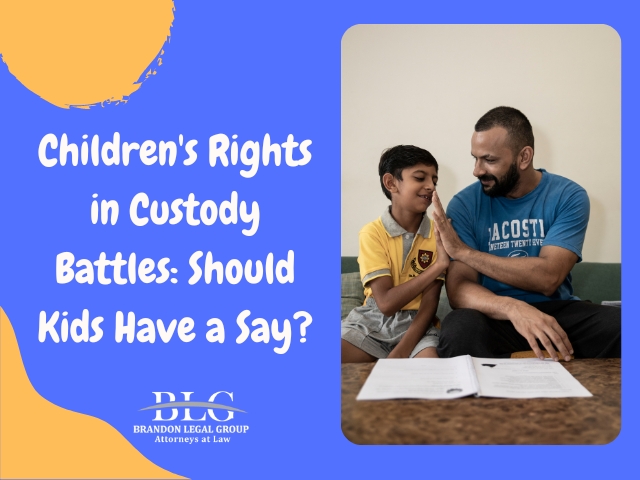Custody battles can be one of family law’s most emotionally charged and challenging aspects. As parents contest custody, it’s easy for children’s voices to be overshadowed or even silenced altogether. But what are children’s rights in these disputes, and should they have a say? This article will explore the role of children in custody battles, the legal framework surrounding their participation, and how a custody attorney can help ensure that children’s voices are heard.
The Legal Rights of Children in Custody Cases
In many jurisdictions, children’s opinions are considered during custody proceedings. The court often considers the child’s age, maturity, and preferences, provided they align with the child’s best interests.
Child Preference and Age Consideration
Children’s preferences may carry weight in a court’s decision, but that weight often depends on their age and maturity. Generally, the older and more mature a child is, the more seriously their opinions are considered.
Interviewing the Child
Some judges may interview the child privately in chambers to understand their preferences and feelings. This practice helps to gauge the child’s genuine opinion without parental influence.
Purpose of the Interview
The main objective of privately interviewing a child is to give the court an unfiltered understanding of their feelings, thoughts, and preferences concerning their living arrangements. This method is considered vital in certain circumstances to ascertain the child’s best interests, which is the primary criterion in child custody decisions.
How the Interview Is Conducted
The interview is typically conducted by a judge in a private setting, away from both parents and their attorneys, to ensure that the child feels comfortable speaking openly. Depending on the jurisdiction and the child’s age, the judge might be assisted by a child psychologist, social worker, or guardian ad litem.
The environment is usually designed to be non-threatening and relaxed, helping the child feel at ease. This can involve using simple language, offering toys or drawings to engage the child, and avoiding direct questioning that might feel intimidating.
Topics Covered
The conversation may cover various subjects depending on the child’s age and case. Topics might include:
- Living Preferences: Which parent or guardian the child would prefer to live with.
- Relationships: The child’s relationship with each parent, siblings, and other significant family members.
- School and Social Life: Different custody arrangements might affect the child’s education and friendships.
- Concerns or Fears: Any specific worries or fears the child may have about living with one parent over the other.
Age Considerations
The child’s age and maturity will play a significant role in whether an interview takes place and how much weight the child’s opinion carries in the final decision. Younger children may be less likely to be interviewed, or their opinions may be considered more cautiously.
Legal and Ethical Considerations
Different jurisdictions have different rules about interviewing children, including the age at which a child’s opinion may be sought, the manner of questioning, and whether a conversation record must be kept. These considerations help maintain the process’s integrity and protect the child’s interests. Prior to the custody hearing, an attorney can guide the child through the interview process and assure the parent of their presence, ensuring the child’s comfort and understanding.
While interviewing the child can be seen as a positive means of including them in decision-making, it is not without potential pitfalls. Critics argue that the responsibility may make children feel pressured, confused, or burdened. Others worry about the potential manipulation by a parent before the interview.
Interviewing a child in chambers is a complex but often crucial element of child custody proceedings. When done correctly, it can offer invaluable insights into the child’s wishes and needs, aiding the court in making a decision that genuinely reflects the child’s best interests. The practice balances the need to hear directly from the child with the requirement to protect them from undue pressure or manipulation. This delicate balance underscores the importance of the judge’s skill and discretion in conducting these interviews, always keeping the child’s welfare at the forefront of the process.
The Best Interest of the Child
Ultimately, the court’s primary concern is the child’s best interests. Even if a child expresses a strong preference, the court will consider other factors to ensure that the final decision aligns with what’s best for the child.
The Voice of the Child: Professional Representation
Sometimes, courts may appoint a guardian ad litem or a child advocate to represent the child’s interests. A custody attorney with experience in this area can assist in ensuring that the child’s voice is effectively conveyed.
Appointing a child representative or advocate is used in custody disputes to ensure the child’s interests are accurately and independently represented in court. This may be done when the child’s preferences and well-being are contested or when there are concerns that the parents might not adequately represent the child’s views. The child representative or advocate, often a trained attorney or child welfare expert, serves as a neutral party to investigate the situation, speak with the child, and present the child’s wishes and interests to the court. They work to understand the child’s desires, assessing them in the context of the overall family dynamics and the child’s best interests.
While the parents’ views are also considered in custody decisions, the child representative ensures that the child’s perspective is not overshadowed by parental conflict or bias. The representative’s recommendations can carry significant weight in court, helping to inform a custody decision that aligns with the child’s actual needs and best interests. A custody lawyer can guide parents through this process, clarifying the role of the child representative and working collaboratively to achieve an outcome that respects both the child’s and parent’s views.
The following is a DRAMATIZATION AND NOT AN ACTUAL EVENT: Sara, a 14-year-old girl, was caught in her parents’ bitter custody battle. Her father wanted to move to another state, while her mother wished to stay local. Sara had strong feelings about remaining close to her school and friends. A guardian ad litem was appointed to represent Sara’s interests. Her custody attorney worked closely with the guardian to ensure Sara’s voice was heard. Ultimately, the judge considered Sara’s wishes, and the custody arrangement favored her mother.
The Role of a Custody Attorney
A custody attorney plays an essential role in representing parents in custody disputes but can also act as a vital advocate for children’s rights.
- Advocating for Children’s Participation: An attorney can encourage the court to consider the child’s opinion, helping ensure their voice is recognized within legal bounds.
- Assisting in Appointing a Guardian ad Litem: If necessary, a custody attorney can assist in appointing a Guardian ad Litem to represent the child’s best interests.
- Navigating Complex Legal Processes: Custody cases can be complex. A custody lawyer can help parents understand the legal process and advocate for the best possible outcome for the child.
Ethical Considerations and Concerns
While considering children’s opinions in custody battles is often viewed positively, it can also raise ethical dilemmas. Ethical considerations often involve recognizing the child’s ability to express preferences and feelings, depending on their age and maturity. This respects their autonomy and individuality, ensuring their voices are heard and given proper weight in decision-making.
Balancing Parents’ Rights
Parents have rights, but these must be balanced against the child’s welfare. Ethical considerations require an unbiased assessment that avoids favoring one parent over the other without cause and looks at factors like the ability to provide a stable environment, emotional support, and physical care.
Avoiding Conflict and Trauma
Ethical considerations also involve minimizing conflict and potential trauma to the child. This may include mediation between parents, protecting the child from disputes, and ensuring a smooth transition if custody changes occur. For professionals involved in custody battles, such as attorneys, mediators, and judges, ethical considerations extend to their conduct. This includes maintaining confidentiality, avoiding conflicts of interest, and impartiality and fairness in their roles.
Potential Pressure and Manipulation
Children may feel pressure from parents to choose sides. They may be subject to manipulation or coercion, either intentionally or unintentionally.
Emotional Strain
Being directly involved in a custody dispute can be emotionally taxing for a child. The legal process may be intimidating, and the child might feel burdened by the responsibility of having a say in the decision.
Balancing Children’s Rights with Parental Authority
Striking a balance between honoring children’s voices and respecting parental authority can be complex. Courts must carefully consider the overall family dynamics, the child’s best interests, and the rights of the parents.
Age Considerations in Weighing Children’s Opinions
The weight given to a child’s opinion in custody disputes varies considerably based on age and maturity level. While laws and practices vary by jurisdiction, different age groups of children are considered, and the extent of their say in the proceedings is generally considered as follows:
Younger Children (Typically Under 12)
For children under 12, courts may be more hesitant to heavily weigh their preferences, as they might be more susceptible to influence by parents or may not fully grasp the implications of their desires. These children’s feelings and wishes may still be considered, but other factors will likely carry more weight in the final decision.
Older Children (Typically 12 and Above)
For children aged 12 and older, their opinions are generally given more weight in custody decisions. These older children are often viewed as having a more developed understanding of their needs and a more precise ability to express their genuine preferences. However, their opinions must still align with their overall best interests.
Florida Laws Regarding Children’s Right of Say in Custody Battles
Florida custody laws place significant emphasis on the child’s best interests in custody decisions. The state’s laws reflect this priority, and considering a child’s preference is part of this approach.
No Specific Age Threshold
In Florida, there is no specific age at which a child’s opinion automatically becomes a factor in custody decisions. Instead, the law provides that the court may consider the “reasonable preference of the child if the court deems the child to be of sufficient intelligence, understanding, and experience to express a preference.”
The Best Interests Standard
A comprehensive set of factors guides Florida’s custody decisions to assess the child’s best interests. A child’s preference is just one of these factors. Other considerations include:
- The mental and physical health of the parents.
- The child’s adjustment to their home and school.
- The ability of each parent to facilitate an ongoing relationship with the other parent.
Role of Child’s Counsel
In some cases, Florida courts may appoint an attorney to represent the child’s best interests. This legal representative ensures that the child’s voice is heard in court without the child’s direct involvement in legal proceedings.
Conclusion
Considering children’s opinions in custody battles is a delicate balance that requires careful evaluation of their age, maturity, and the overall context of the family situation. Children’s participation in custody disputes raises essential questions about their autonomy, protection, and the overall fairness of the process. By working closely with legal professionals who understand the unique challenges and opportunities in these cases, families can approach custody battles in a way that recognizes children’s rights and contributes to a decision that genuinely reflects their best interests.
In Florida, the child’s right to say is guided by an approach that does not set a specific age threshold but focuses on the child’s intelligence, understanding, and overall best interests. A custody attorney with experience in Florida’s laws can help families navigate this complex area, ensuring that the child’s voice is appropriately considered within the legal framework.
